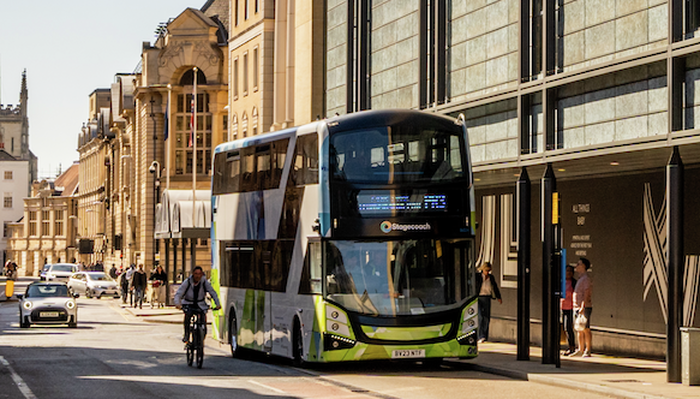The student society trying to make May Balls more sustainable
Elsie McDowell talks to the Cambridge University Environmental Consulting Society about their efforts to make May Balls more sustainable

May Balls are the epitome of revelry and excess. A night of unlimited food and drink, fireworks, rides, and elaborate outfits; putting ‘May Ball’ and ‘sustainability’ in the same sentence seems at best like an oxymoron. Anyone who has worked at a ball can attest to the sheer amount of waste produced across the night - litter picking becomes a never-ending process.
But Cambridge University Environmental Consulting Society (CUECS) is trying to change this. Through their flagship Sustain-a-Ball program, for the last five years they have worked to audit balls across a range of environmental and social goals, providing them with a bronze, silver, gold, or platinum ranking. This accreditation is based on the percentage of targets prescribed by CUECS that are met during the final event.
For the 2025 scheme, there were eight broad policy goals: re-usable decorations, responsible food, recycled waste, reduced carbon, sustainable fashion, social accessibility, pride in sustainability, and accredited planning. Each of these are further separated into two or three more specific, measurable targets. For instance, goal 1.1 stipulates that at least 50% of decorations at the event be re-usable, and goal 2.1 assesses whether at least 40% of food for the event was sourced within a 100 mile radius of Cambridge.
“The main mission behind our society is that every sector can become more eco-friendly”
Current CUECS president and final-year HSPS student at Christs, Ruby Livingstone, emphasised that “the main mission behind our society is that every sector can become more eco-friendly, so I hope it opens people’s eyes that so many diverse aspects of the May Ball, from transport to catering to communications, can be made more sustainable.”
These goals are not just environmental in nature. Modelled on the Sustainable Development Goals, the targets also include social targets, including goal 6.1 to pay student workers a living wage, for instance. Ruby sees this as a particular strength of the programme. “I think the fact that the accreditation framework is so holistic gets people thinking outside of the box on sustainability,” she notes.
Five May Balls participated in the 2025 programme, all of which achieved at least a bronze accreditation. Pembroke, meeting some 97% of the relevant criteria was crowned the most sustainable ball, and achieved the Platinum certification. There were only two sub-goals that they did not meet. Corpus Christi was also particularly successful, meeting 92% of criteria and achieving Gold.
Last year’s Corpus May Ball President Yashas Raj emphasised that he saw the Sustain-A-Ball as an “opportunity” to show that “small sustainability adjustments can lead to meaningful changes”. He mentioned that, for example, Corpus did not serve any beef or lamb during the event, prioritised sourcing locally, and intentionally designed decorations that could last beyond one night.
“As a PhD student working on climate repair, sustainability is an important part of my life,” he added. “We proved you can run an amazing event while keeping sustainability at the heart of it; and hopefully guests came away with a better appreciation of how simple livelihood adjustments can help them live more sustainably as well.”
Sustain-A-Ball is an opportunity to show that “small sustainability adjustments can lead to meaningful changes”
Johns also achieved a gold certification with 92% of criteria met, as did Murray Edwards with 79%. The auditors noted that the Garden Party did particularly well with ‘communication’ goals, such as goal 7.2, which encourages committee members to inform guests, workers, and contractors of the ball’s sustainability strategy.
The fifth ball to participate, Magdalene, achieved a bronze certification, with evidence provided for 40% of criteria. Auditors noted that Magdalene achieved many “legacy” actions that will help the ball progress year-on-year. Indeed, Ruby noted that the aim of Sustain-a-Ball is not “about naming and shaming”. Instead, she wants to ensure that “good practice gets rewarded”.
“The transparency mechanism is also really important in my opinion, because it gives people who care about sustainability the opportunity to vote with their feet when buying May Ball tickets.”
With only five balls participating, however, it is difficult to provide a comprehensive ranking for May Ball-goers to access. This year’s Sustain-a-Ball lead for CUECS, Francesca Yunchu Xie, emphasised her aim to expand the programme to all major Cambridge balls, as well as other large society or subject events. She added: “we want to continue building on the strong relationships with May Ball and June Event committees, and start offering more in-depth strategic consultations throughout the year to support them beyond accreditation.”
The Sustain-a-Ball team is working on developing a new five-year sustainability plan to help strengthen impact in the longer-term. Francesca emphasised that the key focus of this will be Scope Three emissions, which are more indirect emissions caused by an event, such as supply chains, catering, and waste.

Are we really too busy for the bus?
May Balls are of course frivolous events, and it is worth recognising that these are small changes in the face of this. But May Balls are also by all means here to stay. A programme like Sustain-a-Ball recognises this, and works to, as Francesca put it, “make sustainability both measurable and creative.”
 News / Judge Business School advisor resigns over Epstein and Andrew links18 February 2026
News / Judge Business School advisor resigns over Epstein and Andrew links18 February 2026 News / Hundreds of Cambridge academics demand vote on fate of vet course20 February 2026
News / Hundreds of Cambridge academics demand vote on fate of vet course20 February 2026 News / Petition demands University reverse decision on vegan menu20 February 2026
News / Petition demands University reverse decision on vegan menu20 February 2026 News / CUCA members attend Reform rally in London20 February 2026
News / CUCA members attend Reform rally in London20 February 2026 News / Gov grants £36m to Cambridge supercomputer17 February 2026
News / Gov grants £36m to Cambridge supercomputer17 February 2026









